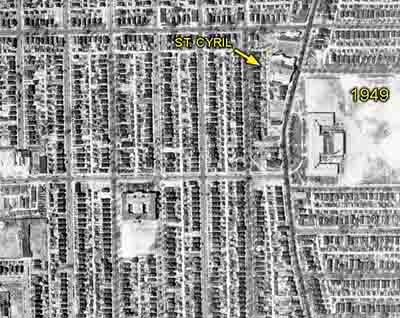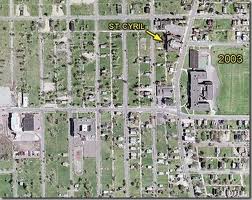
(The lower 9th Ward of New Orleans, five years after Katrina.)
So, the morning jig through the very strange year of 1973 in the Motor City was interrupted by a call from my Coon-Ass buddy, Boats.
He was up early to head to his current position as a moderately senior Government employee involved in Homeland Security. He took umbrage with my contention that the urban centers of America were all burned down in the rage that followed the assassination of Dr. King in 1968.
He was on a tear, I will tell you. But I need to give you some context on what he said first.
Boats is a life-long federal officer, currently geo-baching it in the National Capital Region trying to nail down his “high three” pay years to calculate his retirement.
Boats is a Southern Man, through and through. He is proud to be a Master Chief Bo’sun’s Mate, and equally proud of his status as a coon-ass Louisiana native. He normally lives in the Crescent City of New Orleans, and the winters up here make him a tad cranky. I don’t blame him. We were supposed to get some sleet last night, and the winter is hanging on like grim death into April.
I don’t think he takes any pleasure in the fact that more people have been displaced from my birth city of Detroit in the last decade than had to flee the destruction of Hurricane Katrina in his.
There was a lot of coverage of the spectacular destruction of the Lower Ninth Ward, and the exodus of the residence after the levees failed. People are coming back, though, and the city is back to about 80% of the population it had before the storm.

(Arial photo of the neighborhood around St. Cyril Cathedral near Haper and Van Dyke, 1949.)
Detroit, by way of contrast, has two thirds of the total population of the Big Easy and has sufficient abandoned lots to cover the entire city of San Francisco. The more than hundred square miles that compose the Motor City proper are divided between expanses of decay and eerie emptiness between tracts of still-functioning communities and commercial areas. “Urban Prairie” is the current term of art for the swaths of vacant property growing up in waist-high grass.

(The same neighborhood as an urban prairie in 2003.)
“You wrote that all the other central cities in the nation were torched,” said Boats, without much in the way of pleasantries.
“Yeah,” I said, with a little apprehension. “Sure seemed like it at the time.”
“Well, for the record, Buddy, the cities of New Orleans, Baton Rouge, Mobile, Houston, and most of the big cities from Georgia to Texas did not burn, or for that matter even experience riots.”
I held the cell phone to my ear, wondering if that was true. It certainly seemed like everything was on fire that season, but maybe it was because I was living next to the Big Tinderbox east of 8 Mile.
“Contrary to the northern press musings it wasn’t because these cities had more draconian controls over the black population. Looking back,” said Boats a little less forcefully, “I think it was simply a case of proportion and proximity. While we had experienced formal legal segregation, in fact, there were so many of us living in close proximity that whites in these southern cities may not have moved in the same social circles with blacks but everyone personally knew and interacted with people of the opposite race that they liked and respected.”

“That certainly was not the case in Detroit. We were separated by the wide swath of 8 Mile and seven more miles in Grabbingham,” I said.
“Down south, we knew we were different from each other but neither of us thought of the other as alien. Even with formal segregation we weren’t as segregated of a society as the northern and Los Angeles “ghettos”. It would have been hard to identify a “ghetto” in these southern cities that tasted sit-ins, and protests, but not riots and looting and burning.”
I nodded to no one in particular.
“When the big change finally came,” Boats continued, “we didn’t have as big a gulf of mistrust and bitterness to overcome. The South isn’t proud of its history of race relations but we actually had relations, not isolation.”
“The latest census indicates that African-Americans are fleeing the cities and moving to the suburbs. There is even a significant reverse migration down south,” I said. “That was pretty surprising.”
“It would only be surprising to you Northerners. Strained relations can be repaired. Isolation must be “overcome” and it will be violently overcome if it is easy to dehumanize your adversary and it is easy to do so if you have no contact.”
“There wasn’t any diversity in Grabbingham,” I said. “Though I have to say that Detroit has the largest Mideast populations in the West. The Chaldean and Iraqi communities are huge.”
“Well,” Boats responded, “In the South we have always known each other, and we have not been universal in our likes and dislikes on either side. The bottom line of history, I think, is that the riots of the North and California were not neighbor-against-neighbor conflicts but an expression of anger by one group against another that they didn’t know and saw universally as oppressors. In New Orleans, if it had happened it really would have been neighbor against neighbor; and before it happened, we really looked at each other and decided that nothing was worth that.”
“The violence in Detroit was oriented against business, and then in the years of the crack epidemic it was directed against the community itself.”
“Yep. What is it about “Yankee” culture that causes it to look south always with thoughts of what “corrections” our region needs? Why do you always think that we need “instruction?”
“I dunno, Boats. I had not thought about it that way. It is like what the Canadians say about the US Border: it is the longest one-way mirror in the world.”
“Yep. You see only a reflection of yourself. You say Detroit is dead?” Declared Boats. “If you want to see where America makes cars drive through Georgia southwest from Atlanta towards Birmingham, AL. You won’t see a big city with car plants you’ll see big plants set in among cow pastures and soybean fields with full parking lots of workers who commute from rural communities in a twenty mile radius.”
“It was the companies getting out from under the Unions,” I said. “It destroyed the working middle class that could afford the cars they built.”
“Take it further. You say the family farm is dead? Take a look at rural Louisiana, East Texas, Mississippi and parts of Tennessee. Very conventional family farms dot the landscape peopled by young families. The male of the household has a job that requires travel and long periods away from home followed by long periods free of any daily employer imposed grind.”
“Typical employment includes working the off shore oil rigs, crewing the tows on the Mississippi, and over the road truck driving, all relatively high wage hard work for high school graduates. The father on those farms, black and white, puts part of his income into the family farm. In those poor years when it doesn’t make a nice profit serves as a tax shelter from the overreach of Uncle Sam.”
“There is an aspect of Northern urban government that raised taxes as the revenue base shrunk. It crushed everything. No business could make a profit and survive. Everything imploded.”
“You got it. Our suburbs and college towns are quietly filling with retirees, our country side is not abandoned. Yet our resistance to all those federal policies that caused the northern family farm to be sold out to corporate farmers, and the countryside to be abandoned, and the city centers to generate ghettos is met with utter contempt.”
“I can’t quite get over the resentment of what happened, and it all turned on the back of labor and ace,” I said. “Chicago lived, and Detroit died.”
“Lets be real about the history of the sixties” said Boats quietly. “Segregation had to be ended in the South and it came with some pain and even death. But it came without riots and burning of cities. Those events were peculiar to a different culture from us, with its own set of racial problems that were unique to that region.”
“Segregation continued right up to this last decade in the North,” I said thoughtfully. “But it was de facto, not de jure.”
“And it still does. Southerners white and black did not cause the northern riots, looting, and burnings. Southern whites burned some crosses and a couple of churches and murdered about a dozen people before racial relative peace was restored in the South and segregation was deconstructed.”
“What happened elsewhere in the country during that era may have traced its earliest origins to the out migration of blacks from the South at the end of the Civil War, but there was no southern-based conspiracy that ignited those riots. The riots were the local reaction to local conditions, It was a stranger-on-stranger war.
“We had some murders among family and decided to make peace. We are progressing today. In the thirteen states of the Old South there is no “rust belt”. The Klan is all but dead. Our big battles today are keeping what we have built from being ruined by the same short sighted tax-spend-social engineer and dictate policies that originate in places like Massachusetts and then become law and policy in Washington.”
“If the South could form a new confederacy today it would be a peaceful and prosperous, financially responsible, middle power. What would be left would be a bickering, rusting, interventionist, bankrupt superpower wanna-be headed for collapse.”
“Ouch,” I said. “That is sort of a harsh assessment.”
“It is, but true. The South, never looked to for wisdom, is today the brakes on the train wreck that our Yankee-led nation has become.”
“It is a little bit of a stretch to call a Chicago Progressive Administration a bunch of Yankees.”
“I am only using the term as we speak it down South. By the way,” Boats said. “In-southern speak “Yankee” does not include areas south or mostly south of the Mason Dixon line like Maryland, Delaware, or Kentucky, nor most of the Midwest, west of Illinois, or the Mountain West, but it definitely includes the “Left Coast.”
“Yeah, and with California projecting a twenty billion dollar annual budget shortfall that has got to change.”
“The South will not rise again, it has risen but is dragging the dead weight of an alien culture, one that I’ve now seen up close and personal in Washington DC. It will slow the descent of that culture but the dead weight is too much. We will sink with the Yankees unless we find a way to regionalize and compartmentalize our gains without wasting energy and resources on another war of succession.”
“Is that what all that neo-nullification state legislation has been part of?”
“That is my view,” said Boats firmly. “Next, look for a wave of ineffective mitigation barriers to try to keep the alien culture from doing to the rest of South what it has done to Florida. The union can and will be broken not by states trying to exit, by the natural results of its own political and budgetary foolishness.”
“Once its back is broken, it will be in no position to stop the independent rise of any former region poised to prosper. Rome fell, it is deader than a stone. But Italy is a nice place today. That is how we are thinking in the modern South today.”
“Copperheads should start carving out a place for themselves among us while there is space remaining in the life boats. We will not preach or try to impose our values on the Yankees. The tendency to impose outside solutions on alien cultures is a Yankee cultural trademark, not ours. We are busy caulking our region for the flood to come. After we survive the flood we will concentrate on rebuilding prosperity and peace under a model that would be familiar to Washington and Jefferson, but alien to Hamilton.”
“If all of American history is the rattling of the chains of the ghosts of Hamilton and Jefferson the truth is the South never liked that little elitist prick Hamilton. When he is done running amok among the Yankees, we are going to permanently lock him out of the South.”
“That is a lot to plow through, Boats,” I said, wondering if this was a north-south problem, or a red and blue one.
“In the immortal words of Texas’s Judge Roy Bean: “and that’s the way it was, and if it wasn’t like that…that’s the way it shoulda been.” I might add, gonna be.”
“I gotta think about this, Boats, but thanks. I have been wondering how to parse the great divide between the Tea Party and the progressives. The gulf is so vast that the government seems to have become completely dysfunctional.”
“Yep,” he said. “But I have to go. The dysfunction hasn’t got to my cubical yet. But we may all get furloughed next week when the Government shuts down.”
“We did not get to the fact that this is going to be an America that speaks Spanish pretty soon,” I said. “And that is going to take a little getting used to.”
“Trust me, when you have been occupied by an invading army, you figure things out pretty quickly. Adios, Amigo,” said Boats, and broke the connection.
Copyright Boats and Vic 2011
www.vicsocotra.com
